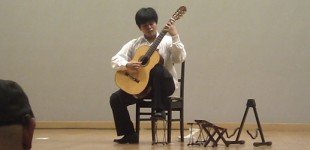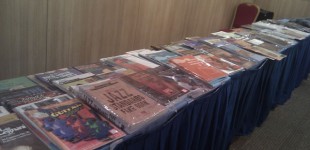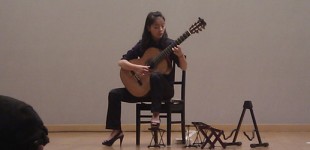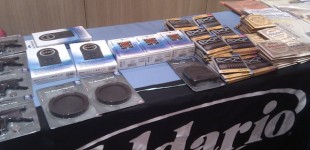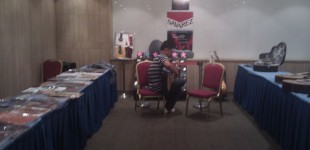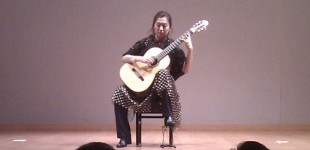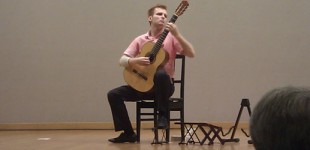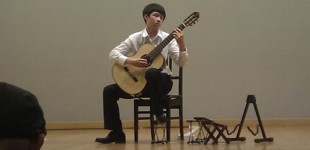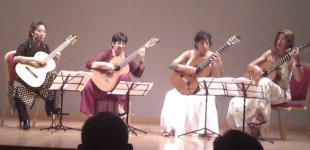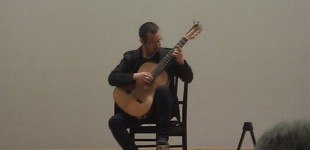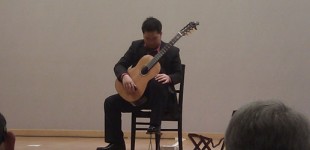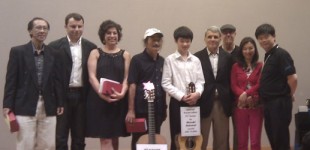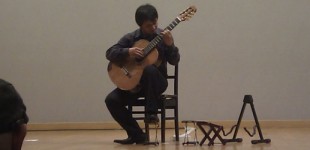Recently, I attended some concerts held as part of the International Guitar Festival (Singapore) 2011 at the RELC International Hotel.
Here are my impressions:
Kaori Muraji
Turnout for this event was excellent. Muraji was very well received by the local guitar and arts community. There was also a substantial amount of Japanese people in the audience.
Muraji started her programme with an accessible selection of pieces. She opened with Introduction and variations of Magic Flute of Mozart followed by Prelude No.1 by Heitor Villa-Lobos. She also performed La Cathedral by Agustin Barrios before performing Hiroku Sato’s arrangement of Eric Claption’s “Tears in Heaven”. The arrangement had unmistakable influences of Tarrega’s “Lagrima” (Spanish for “Tears”). After this piece, she addressed the audience for the first time, conversing in English and peppering some words of thanks in Japanese for the Japanese community’s strong support for her concert.
She finished with the Carmen Suite by Georges Bizet, also arranged by Hirokazu Sato.
For the second half of the programme, a Masaki Sakurai RF Guitar was placed on stage for her. She started the second half of the programme with Suite Compostelana by Federico Mompou before performing Hirokazu Sato’s arrangement of Tchaikovsky’s Waltz of the Flowers from the Nutcracker Suite.
She finished with Domeniconi’s Koyunbaba. Before Muraji started on Koyunbaba, she swapped her Kohno for the Sakurai. She explained that because of Koyunbaba’s unusual tuning, she would be using the Sakurai, that was already pre-tuned.
The crowd clearly loved her, bringing her back for 2 encores. She played Roland Dyen’s “Tango en Skaii” and Stanley Myer’s “Cavatina” for her encores.
It was an excellent performance that was slightly marred by the venue’s sound system. It was unable to faithfully reproduce her tone. This would be very evident in the unamplified performance during the shared “Divas’ Concert”.
“Diva’s Concert”
This rather poorly-named concert was the replacement concert for Dale Kavanagh. Due to the sudden cancellation and lack of a programme, turn out was quite low. Only 25% of the hall was occupied.
I had originally considered getting a refund, but decided to attend this concert since my schedule didn’t allow me to attend any of the other concerts.
All 4 artistes played unamplified. The performances were very intimate and acoustically pure; a great way to experience the guitar.
Opening the show was Maria Isabel Siewers from Argentina. She performed Grand Solo by Sor before finishing with “one of her favourite pieces”,Prelude No. 1 from Heitor Villa Lobos.
This was followed by Elena Casoli who played 2 Italian pieces. The first was a traditional Italian piece called “A Day in the Life”, but the second was a modern piece called “Conversations”. She took more time to introduce “Conversations” remarking about how it was like a communique to space and how it was like conversing with different aliens in Star Wars.
The entire piece was played with a glass slide, with no fretted notes. It was very interesting and it achieved its intended musical purpose, though some may find it too gimmicky. It really sounded like an alien communication.
This was followed by a brief intermission.
Kaori Muraji from Japan opened the second half of the programme. She sounded much better unamplified. The difference was quite marked. The tone was more nuanced and the quality of sustain was better. Muraji performed perennial classical favourites. She turned-in flawless performances of Albeniz’s Asturias, Tarrega’s Recuerdos de Alhambra and Invocacion y Danza by Rodrigo.
Classical guitar fans who attended her concert the night before should have attended this concert as well. Muraji sounded much better and she seemed more comfortable on stage the second time around.
The final solo performance was by Gaelle Solal from France. The charismatic and humorous Gaelle was warmly received by the audience. She performed A Dream Zodiac by Roland Dyens and A Felicidade by Antonio Carlos Jobim (also arranged by Dyens).
Closing the recital was a quarter piece featuring all 4 female guitarists.
Competition Finals
Winner
Mu HuaiCong (China)
1 BMW 1005 Allegro (J.S Bach)
2 Le Depart Op.31 (N. Coste)
2nd Place
Marko Topchii (Ukraine)
1. Capriccio Diabolico ( M. Castelnuovo-Tedesco)
2. The Carnival of Venice (F. Tarrega)
3rd place
Ramoncito Carpio (The Philippines)
1 Fantasia on Themes From La Traviata (F. Tarrega)
2. Koyunbaba Suite for Guitar Op. 19 (Carlo Domeniconi) sans the second section
Consolation Prizes
Pongpat Pongpradit (Thailand)
1 Fantasia on Themes From La Traviata (F. Tarrega)
2 Sonata (2nd & 3rd Movement) (L. Brouwer)
Yutthasak Komjornkijborworn (Thailand)
1 Fuga from Violin Sonata BWV 1003 (J.S Bach)
2 Invocacion Y Danza (J. Rodrigo)
Chen Qun (China)
1 Variations on Theme of The Magic Flute (F. Sor)
2 Fantasia on Themes From La Traviata (F. Tarrega)
Francisco Arief Wuryananto (Indonesia)
1 Grand Overture Op. 61 (M. Giuliani)
2 Capriccio Diabolico ( M. Castelnuovo-Tedesco)
Zulkifly M. Noer (Indonesia)
1 Chachonne Part 1 (J.S Bach)
2 Capriccio Diabolico ( M. Castelnuovo-Tedesco)
Judges:
Maria Isabel Siewers
Kaori Muraji
Gaelle Solal
Elena Casoli
Masaki Sakurai
Robert Liew
Rick Smith
Robert Liew gave the closing remarks before he and Gaelle announced the winners. Mr Liew’s comments were that this year’s competition was very stiff and the standard of the competitors was much higher than previous years.
He said that all the competitors were very good technically, but it eventually boiled down to musicality and interpretation. He mentioned that the scores separating the contestants was very close.
Honestly, I was quite shocked that Marko Topchii didn’t win. In my opinion, his performance was the best of the night. Great interpretation, technique, musicality and very clean. I do hope that he will come down again next year. I look forward to hearing him play again.
Muraji and Sakurai presented the winner with his prizes which included a Masaki Sakurai RF classical guitar and a collectible guitar from Antonio Aparicio.
The 2 runners up also received guitars from Antonio Aparicio along with cash prizes strings and other accessories.
Sakurai, in playful fashion, tried to tickle the winner and even made a funny face by sticking his tongue out while taking some of publicity shots.
Exhibitors
Since the event was organized by Tomas Music Consultants, they were the only exhibitor there. There was a good range of books, CDs and DVDs. It was a great chance to get material autographed by the visiting artists.
Low-end guitars from Alhambra and Manuel Rodriguez were also on display. Thomas was selling the Alhambra 2C (U.P $513) at a very special price of $380 during the festival. It was a great steal and an excellent buy.
Sakurai/Kohno guitars made-up most of the high-end guitars on display(which makes sense since he was attending the festival this year).
The entry-level Professional-J was going for SGD $5,500 during the festival, a great price for the instrument.
As I was testing some of the newer Sakurai/Kohno guitars, Jimmy, one of Thomas’s staff was telling me that Sakurai mentioned in his guitar making workshop that he made a “breakthrough” in 2008.
He developed a new bracing system during this period, which he shared with attendees. This new bracing system allows for more power and more penetrating trebles without sacrificing the tone of the instrument. According to Jimmy, this design will only be used for the Sakurai Special models.
The other models (especially those under the Kohno name) will be built to their traditional designs. This includes his famous PC model. Only the Special model under his name will receive this bracing.
I must say that the 2011 Sakurai Special I played sounded spectacular. The trebles were much more penetrating than the 2008 Kohno Special I tried, which had rounder sound. An excellent guitar with a modern sound.
Final take/Other notes
I managed to catch-up with Masaki Sakurai briefly after the competition. It has been 6 years since I first met him in his workshop in Tokyo.
I was surprised to see that this Master Luthier seemed to have aged so much since I last saw him.
He was in good spirits and greeted me warmly. His great energy and humor instantly reminded me of this first time I visited him. Fortunately, he told me that he is unaffected by the Fukushima plant because his workshop is quite far away.
He told me that he spent his time in Singapore eating, shopping and playing some golf at the Sentosa Golf Club. It was nice seeing him again.
I should also mention that I was very disappointed that Thomas did not allow the audience and participants to take photos with the artists.
I understand why they would limit this during autograph signing sessions (which would take forever to end), but Thomas’ people did not even allow photography during off-peak periods, where only 1-2 persons made requests to take photos.
Some of the artists seemed agreeable to the idea, but Thomas’ people did not allow it.
I hope Thomas can reconsider this extremely annoying quirk.
All in all it was a good experience. I wished there was stronger support from the local community though.I was unable to attend all the concerts and seminars because of my work schedule. But I heard that the turnout and response for some of the performances was pretty bad.
I offered to conduct e-mail interviews with the visiting artists to help publicize the event but Thomas decline citing the increased trouble.
A shame considering this is the biggest classical guitar website in Singapore. Aw well. At least I offered.
The competition was also too long. The audience seemed to get noticeably restless after the first intermission. I hope the organizers consider restructuring the format to make the content more accessible. The fact that the same pieces were played so many times (up to 3 times) didn’t help.
I must say that I was disappointed that we did not have a Singaporean representative. With the classical guitar being offered as a principal instrument at La Salle and NAFA I was hoping that someone from Singapore would have stepped up.
I would have liked to see child prodigy Kevin Loh step up to represent Singapore, but I’m not certain if his schedule allowed for his participation.
I’d love to see him participate next year though. I’d even sponsor his entry with my own money! Marcus and Kevin, I hope you’re listening. 🙂
